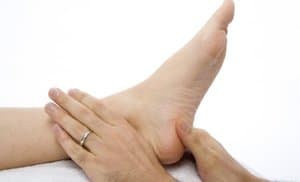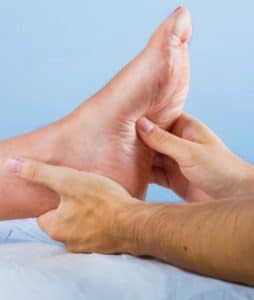
Plantar Fasciitis Pittsburgh
Things to Keep in Mind
Some people develop plantar fasciitis when they start exercising to lose weight. This is particularly common when people over 40 take up jogging. If you suspect that this is the case with you, speak to your healthcare provider. He or she should be able to suggest some alternative activities that will help you achieve your weight-loss goals without putting excess stress on your feet. Some activities (like swimming) are great alternatives that support your weight-loss pursuits, but typically will not aggravate your heel pain.
Sports Injuries
If the cause of your plantar fasciitis is because of sports, your employment, or another responsibility, it may be difficult to stop or reduce your activity long enough to heal your feet. However, giving your feet a break is essential if you wish to stave off future, long-lasting pain. A sports medicine specialist or your primary care physician will be able to recommend an alternative program for replacing your normal activities with those that will not worsen your pain.
If you frequently exercise, talk to your healthcare provider about prescribing physical therapy or referring you to an orthopedist, a specialist in sports medicine or a podiatrist.
Plantar Fasciitis Pittsburgh
You may want to ask your doctor some of the following questions about exercise:
- Should I reduce the amount that I exercise? How often should I exercise per week? How long should my sessions be? Which type of exercises should I be doing?
- Should I put an ice pack on my foot after working out? If so, how many minutes should I apply the ice? When should I stop icing?
- Is the use of nonsteroidal anti-inflammatory drugs (NSAIDs) appropriate in my case? If so, should I take them before or after I exercise?
- Can you recommend any exercises in order to strengthen and increase flexibility in my foot and ankle? If so, how frequently and how long should I perform them.
Why You Shouldn’t Ignore Plantar Fasciitis?
At first this problem may not sound really serious, but as you ignore it, it starts getting worse and when that happens you may experience some consequences that can cause a lot of pain. Some of the consequences of ignoring plantar fasciitis includes:
- Plantar Rupture
Plantar rupture is one of the most dangerous thing you can face by ignore, when this happens your plantar fascia is no longer able to work like before and breaks into two pieces, which may cause a loud pop sound. When plantar rupture happens normal activities like walking become extremely difficult and painful, some people may not even be able to walk, which is why immediate threat is necessary.
If you continue heavy exercises, stand for long periods, or wear improper footwear even after developing plantar fasciitis then problems like plantar rupture may appear. That’s why it’s better to get the proper treatment of plantar fasciitis before such problems appear.
- Plantar Tears
Plantar tears are a less dangerous problem than plantar rupture but still it’s really painful. In plantar tears, your fascia develops more and more tears which are extremely painful. When this happens only your first step of the day won’t be painful but your each step of the day will cause pain, which can make it hard for you to walk.
This usually happens because plantar rupture and has the same causes. So if you continue heavy activities or stand for too long even after developing a plantar fasciitis then it’s time you start doing it and get ready for treatment.
- Heel Spurs
When left untreated plantar fasciitis can turn into heel spurs, which is another painful problem. In heel spurs a bony growth develops around your heel which doesn’t only causes pain but makes it hard to walk. Surgery is the most effective way to treat heel spurs.
Does Plantar Fasciitis Affect Both Feet Or Just One?
While plantar fasciitis can happen in both feet, normally it affects only one at a time. It’s because this problem develops because of excessive strains on your plantar fascia, the ligament that connects your heel to the toes. The strain starts developing wears and tears on the plantar fascia, which in the end causes plantar fasciitis, a foot condition that can cause a lot of inflammation in heel. Since it’s not a disease, but rather an injury, it’s not necessary that it will happen in both feet at the same time but some factor s like biomechanical issues, obesity, or jobs that require prolonged standing or sitting can make impossible. It’s much more common for the problem to happen in both feet if both of your feet’s footwear aren’t good for you. So, in conclusion you can get plantar fasciitis in both feet, but it’s much more likely to happen in just one, strategies like stretching, proper footwear and rest can greatly help out managing symptoms and future chances of plantar fasciitis, so make sure to follow them.
How Long It Takes To Recover From Plantar Fasciitis?
The exact amount it can take to recover from plantar fasciitis can vary because of factors like severity of condition and treatment consistency. On average, most people experience improved results within 6 to 12 months with proper care, rest, stretching, and physical therapy. If your case was mold them it won’t take anything more than a week or two to heal, but a chronic plantar fasciitis can take up to a year.
Is Plantar Fasciitis More Common In Athletes or Non-Athletes?
Plantar fasciitis can affect both, but it’s much more likely to happen in athletes especially runners or those who participate in high-impact sports. Running, jumping and sudden movement during running can easily increase the risks of plantar fasciitis!

